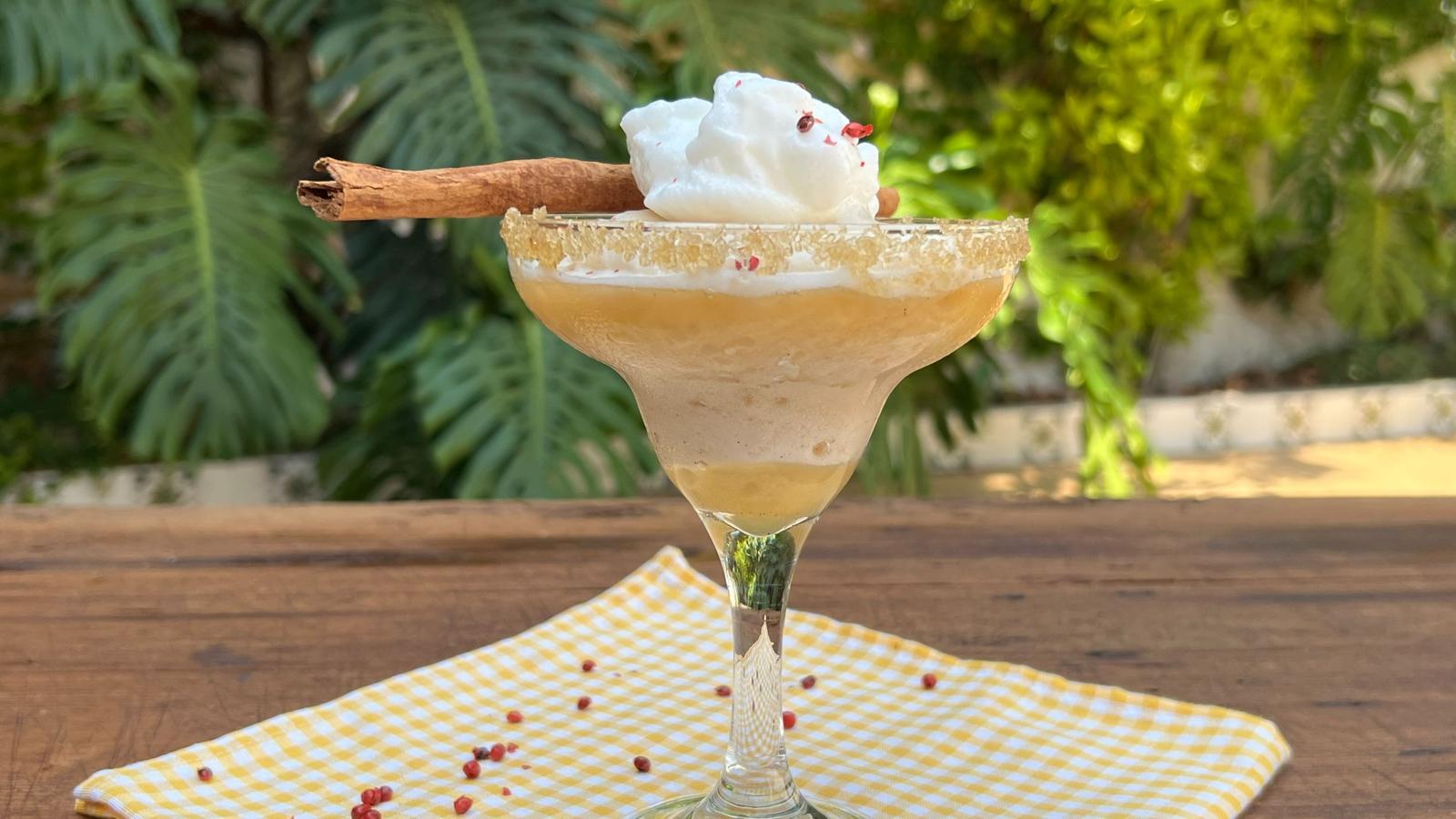l 2 l of water
l 100 ml of lemon juice
The lemon peel
l 100 ml of orange juice
l 300 g of sugar (the original recipe calls for 1,100)
l 2 vanilla pods
l 1 cinnamon stick
l 6 cloves
l 6 cinnamon flowers (optional)
160 ml of cava
l 3 egg whites


PalmThe half-full glass on the tasser, behind the bottles arranged in rows, simple columns that sustained the café's economy. Liqueurs for conversation or for the dead hours of each day. Juices to share, for holidays, or to dilute in the darkness of a cup. Spirits that offered a direct route to forgetfulness and fun. There were also homemade liqueurs, alcoholic waters that took advantage of seasonal fruits and herbs thanks to homemade recipes made with the usual utensils in each house. In some of our recipe books, liqueurs appear as a prominent section. These are recipes for making spirits with digestive, therapeutic, and restorative purposes, as well as being used for all kinds of celebrations.
In the Book of the liquor maker and the coffee maker, third part of the compilation Mallorcan Cuyna (Pere de Alcàntara Penya, 1886) drinks are classified as liqueurs by essence (rose, marasqui); liqueurs by infusion (palo, rum, orange blossom cream), that is, those based on spirit, water and sugar and to which aromatic elements such as flowers, herbs and spices are added. Ratafias, drinks where the flavor is provided by fruits and aromatic herbs and also syrups, which are prepared with a clarified sugar solution and whose function is to serve as a base for other sweet liqueurs. To make preparation easier for readers, the author omits liqueurs obtained by distillation, since a small still would be necessary. This absence will be compensated for thanks to the publication of the Book of wines, liquors and, as necessary, by Lluís Ripoll (1974), which, in addition to liqueurs, briefly reviews Mallorcan wines before and after phylloxera and the home remedies needed to cure the sick. It also includes a drink that was not common in Mallorca until then: punch.
The punch (or punch (in English) is a traditional alcoholic beverage that comes from India, from the Sanskrit word 'bread which means five, referring to the drink's five original ingredients: water, sugar, lemon (or other citrus fruits), tea or spices, and alcohol. British colonists discovered this drink in India in the 17th century, during the period of the British East India Company. They adapted it to their liking and introduced it to Europe, where it quickly became popular. Over time, punch has taken on many variants around the world, often served in large bowls at parties, with ingredients such as rum or brandy, fresh fruit, and juices. One such version is found in Menorca with the name "fist" (a dialectal interpretation of the word "punch"). punch. A mixture of rum or cognac, water, sugar, and lemon peel) and the "ponche" (fist of eggs), which arrived in Menorca during the English occupation in the 18th century. "Ponche de huevos" (fist of eggs) is a sweet, creamy, and alcoholic drink traditionally prepared with egg yolks, sugar, milk, rum, or cognac. It is usually served as a hot drink, topped with a raised egg white, and consumed at Christmas celebrations or for major occasions. In Mallorca, the first versions of ponche were published in the 19th century. The connections between noble families on both islands must have facilitated the exchange of this drink. However, we observe an important change, because the formulas transmitted in 19th-century recipe books are for drinks that include raised egg white and are iced with a pump. This is the case of "ponche" (punch). Llabrés Recipe Book and of the Book of ice creams and complainers, by Mateo Jaume de Can Joan de s'Aigo. This latest volume describes two versions: one with Jamaican rum, which he calls "summer punch," and the "King of James's Punch," flavored with spices and cava instead of rum or cognac. Popular cuisine of Mallorca (Sóller, 1931) describes Russian punch, made with lemon slices, sugar, rum, and boiling water, without specifying whether it's served hot or cold. The fact that the water is hot could be a clue or simply an indication to melt the sugar more easily.
Today's recipe is based on King James Punch. It can be made with or without alcohol, and by substituting rum for the cava, but it's not recommended. The quantities are intended for a celebration, but you can divide them according to your needs.
l 2 l of water
l 100 ml of lemon juice
The lemon peel
l 100 ml of orange juice
l 300 g of sugar (the original recipe calls for 1,100)
l 2 vanilla pods
l 1 cinnamon stick
l 6 cloves
l 6 cinnamon flowers (optional)
160 ml of cava
l 3 egg whites
We'll remove the seeds from the vanilla pod and add them, along with the pod, with half the water and the remaining spices. Boil for a few minutes.
In another container, add the remaining water, the juices, the zest, and the sugar. Heat until the sugar melts and mix with the spice infusion. Refrigerate overnight. Strain the liquid.
We'll put the mixture in the refrigerator, and when it starts to freeze, we'll add the cava. We'll whip the egg white, and when it's stiff, we'll add it and let it stiffen. We'll serve it immediately.
If you don't have an ice cream maker, you can put the liquid in the cooler. Remove it from time to time and blend it to break up the ice crystals. When it has the consistency of a slush, pour in the cava, chill it a little more, and add the risen egg white.
